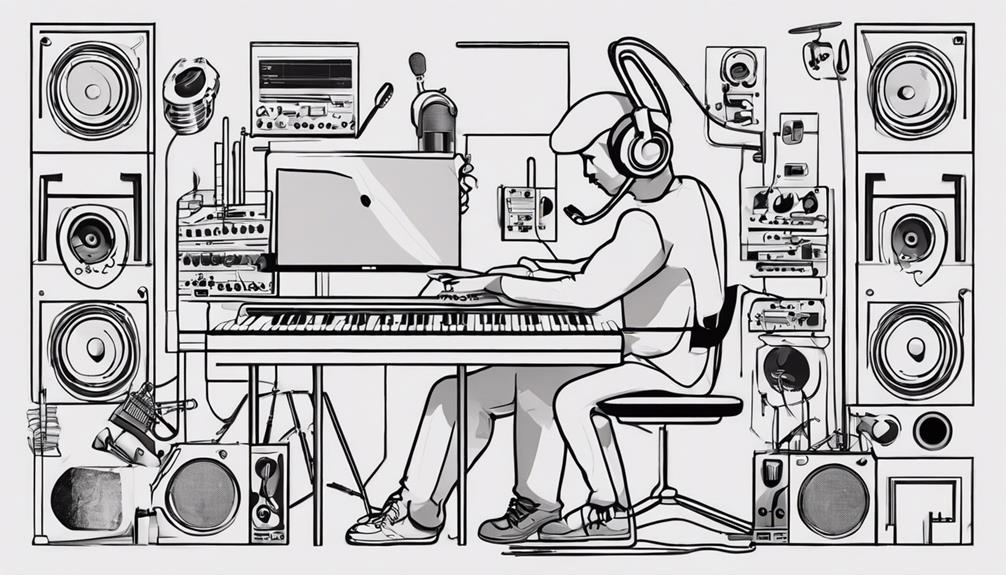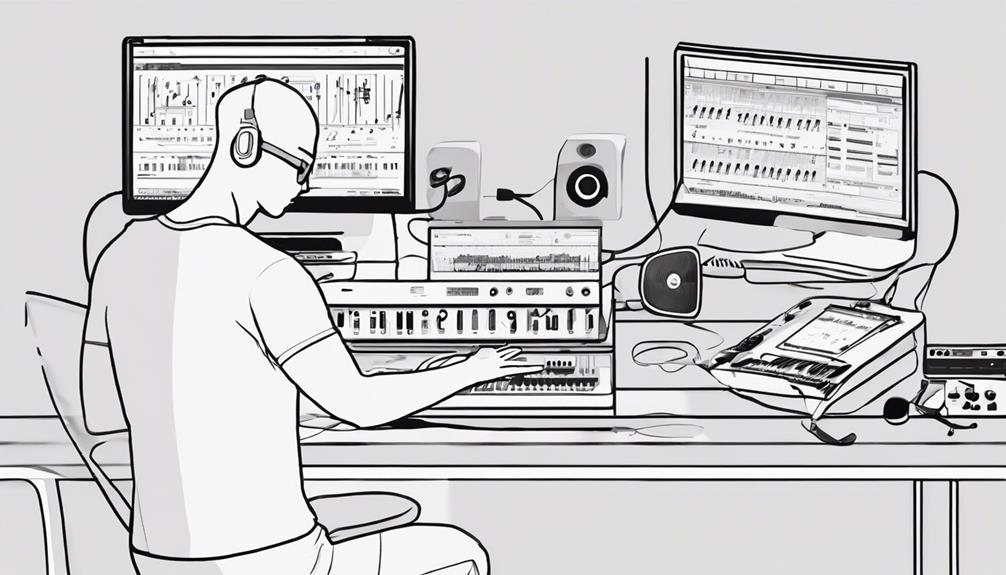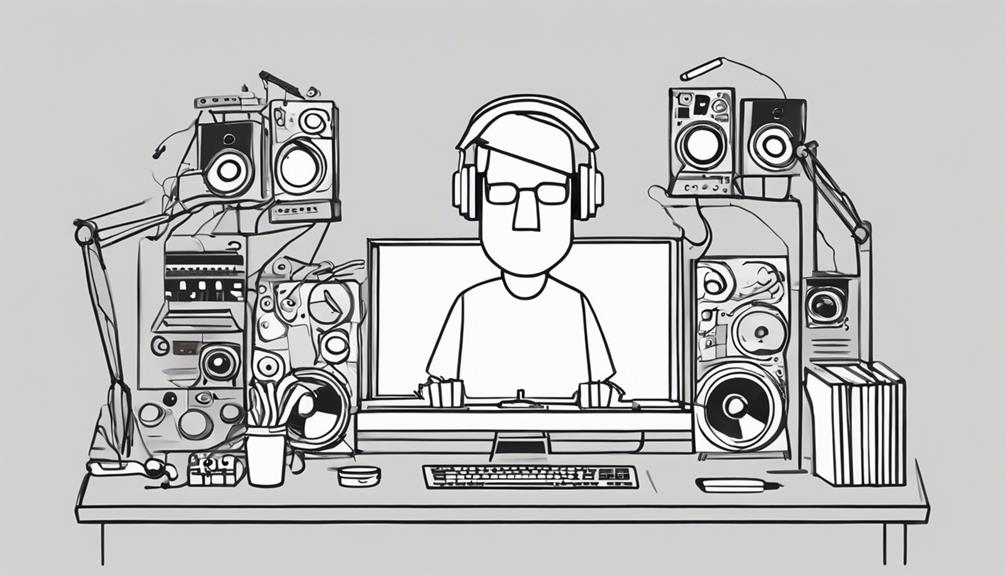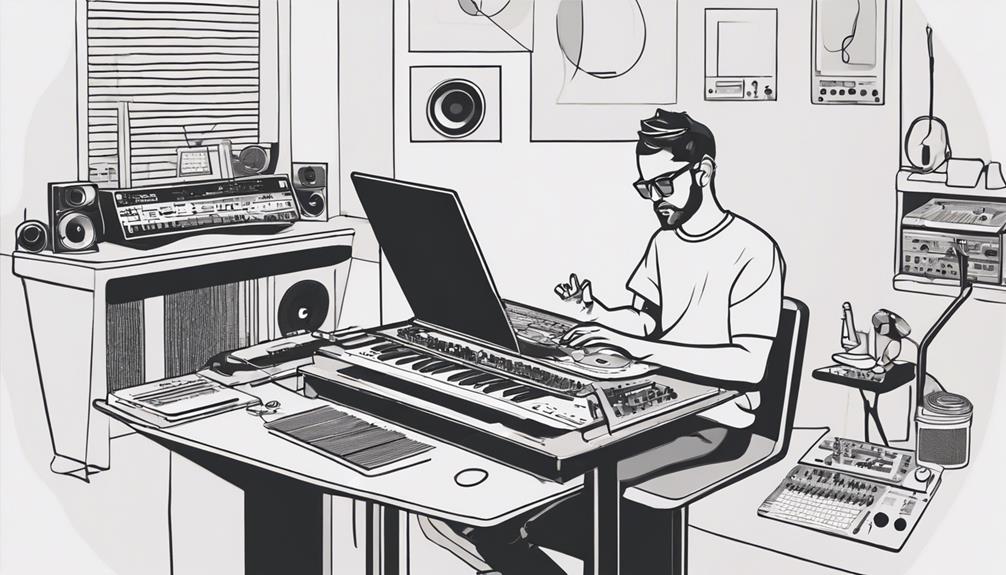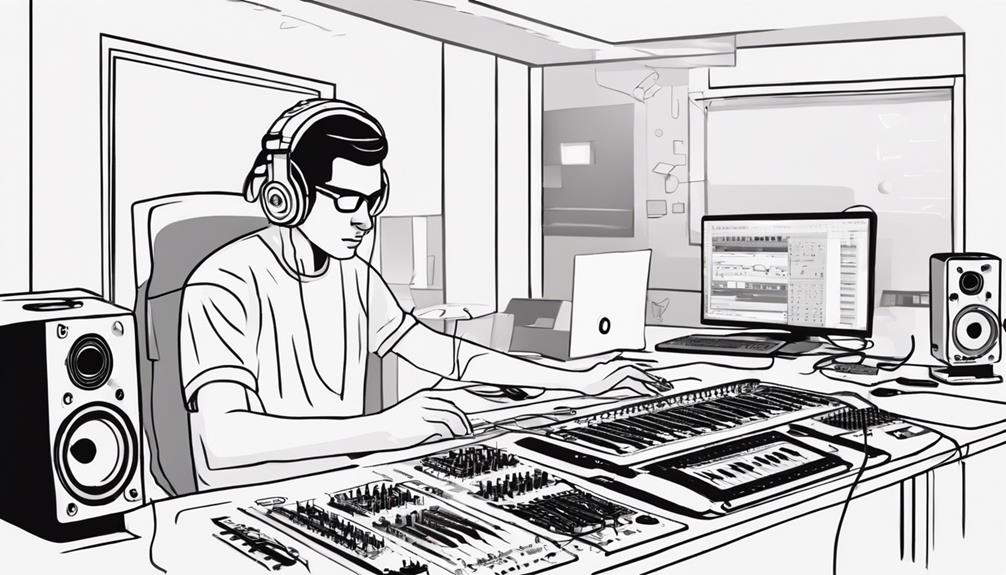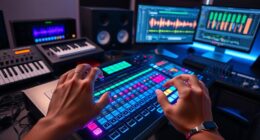To learn music production, start by grasping the basics of creating, recording, and refining tracks. This knowledge acts as the key foundation for success in the industry. Choose the right equipment that fits your needs and budget. Explore various techniques like compression, EQ, and arrangement. Set clear career goals and invest in training programs to enhance your skills. Mastering audio engineering skills is essential for aspiring producers. Collaborate with experienced professionals and practice regularly for improvement. Your journey into music production promises exciting discoveries and valuable insights awaiting your exploration.
Key Takeaways
- Start by learning music theory and technical skills.
- Collaborate with experienced producers and musicians.
- Practice consistently, experiment, and seek feedback actively.
- Utilize online resources, tutorials, and courses.
- Set clear goals, stay organized, and network within the industry.
Understanding Music Production Basics
To understand music production basics, you must grasp the fundamental stages involved in creating, recording, and refining tracks for public consumption. Music production is a multifaceted process that encompasses various elements such as songwriting, composition, and sound engineering. Producers play an important role in working closely with artists to achieve a desired sound and quality for the final tracks.
Sound engineering is a technical aspect of music production that involves the operation of equipment and the configuration of sound to achieve the desired results.
Understanding how producers work and the intricacies of sound engineering is essential for anyone looking to explore into the world of music production. By learning these basics, you lay a solid foundation for your journey in the music industry. This understanding won't only enhance your skills but also help you navigate the complexities of producing high-quality tracks that resonate with listeners.
In this Complete Guide, you'll gain valuable insights into the core principles that drive successful music production endeavors.
Selecting the Right Equipment
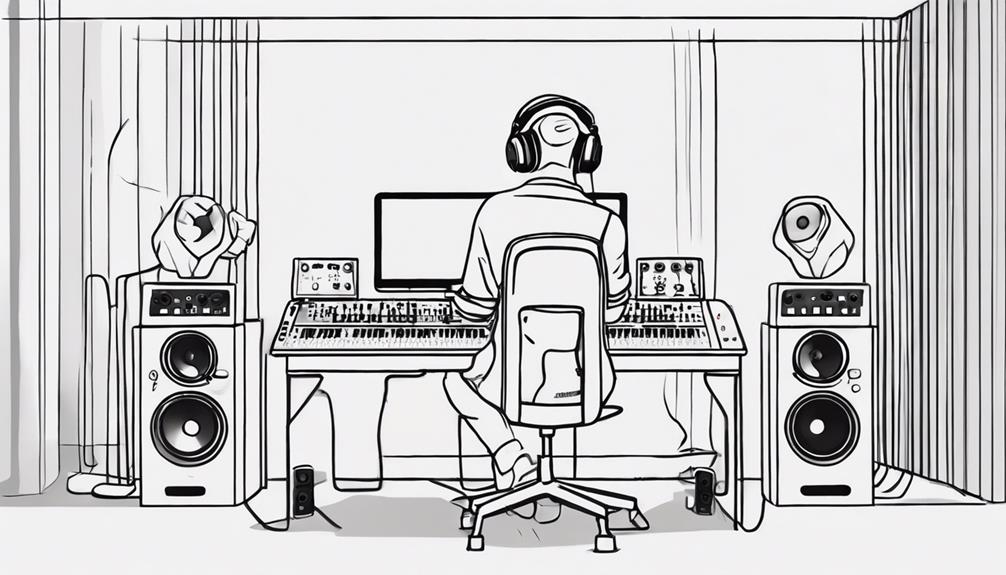
When selecting your music production equipment, it's vital to think about gear that meets your needs and fits your style.
Evaluating your budget while exploring quality options can help you create a setup that enhances your music production experience.
Keep in mind, choosing the right equipment is key for achieving success in your music production endeavors.
Essential Gear Selection
Choose the right equipment for music production by selecting essential gear that suits your recording and mixing needs. An audio interface is important, so pick one based on the number of inputs required for recording instruments and vocals.
When it comes to studio monitors, opt for ones that offer accurate sound reproduction to assist in mixing and mastering tasks effectively. Quality headphones play an essential role in providing detailed audio monitoring during the production process, helping you make informed decisions.
Incorporating MIDI controllers into your setup can give you tactile control over virtual instruments and software parameters, enhancing your creative workflow. Additionally, consider investing in microphones, VST plugins, and sound packs to expand your production toolkit and elevate the quality of your music productions.
Budget-Friendly Options
Embark on your music production journey by exploring cost-effective options for selecting the right equipment. Start by investing in entry-level equipment like audio interfaces and studio headphones, which offer quality without the hefty price tag.
Consider budget-friendly Digital Audio Workstations (DAWs) such as FL Studio, Ableton Live Intro, or Reaper, providing essential features for beginners to start their music production endeavors.
Enhance your setup with affordable MIDI controllers like the Akai MPK Mini or Novation Launchkey Mini, offering versatility and control over your productions.
To expand your sonic palette without spending a fortune, utilize free plugins and virtual instruments like Spitfire Labs, Dexed, or TAL-Noisemaker.
Maximize your learning experience by tapping into online resources such as forums, YouTube tutorials, and free courses to discover more about budget-friendly gear options.
With these budget-friendly choices, you can immerse yourself in music production without breaking the bank.
Exploring Different Techniques
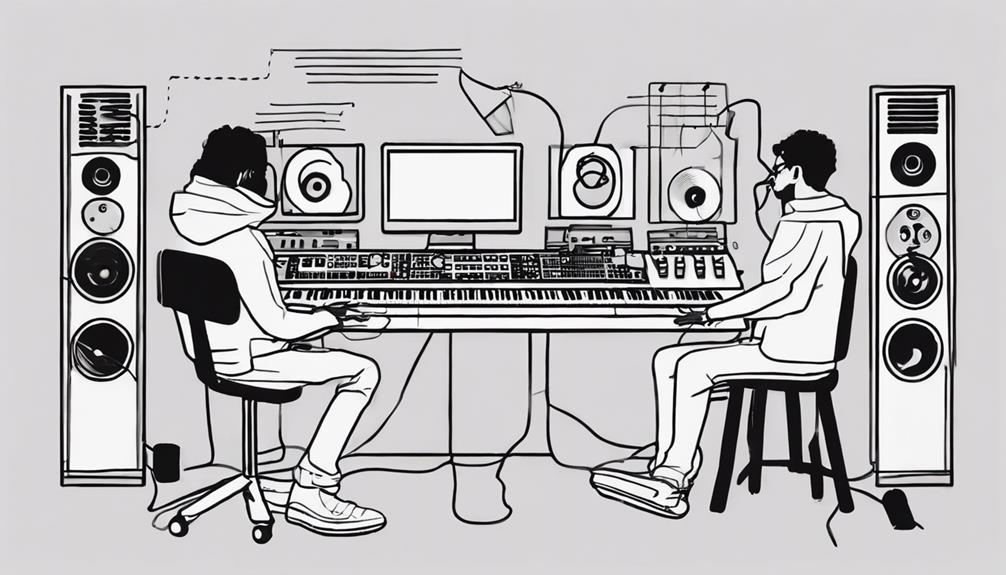
To enhance your music production skills, delve into exploring different techniques such as compression, EQ, and arrangement.
By utilizing tutorials and watching YouTube videos on sound design, mixing, and mastering, you can gain practical insights into these essential techniques.
Experimenting with various VST plugins and software will help you understand their functions and how they can enhance your music production.
Additionally, seeking guidance from experienced producers or mentors can provide valuable knowledge on advanced production techniques that can elevate your tracks.
Consistent practice is key to mastering these techniques. Apply what you learn to your tracks regularly to solidify your understanding and improve the overall quality of your production.
Setting Career Goals
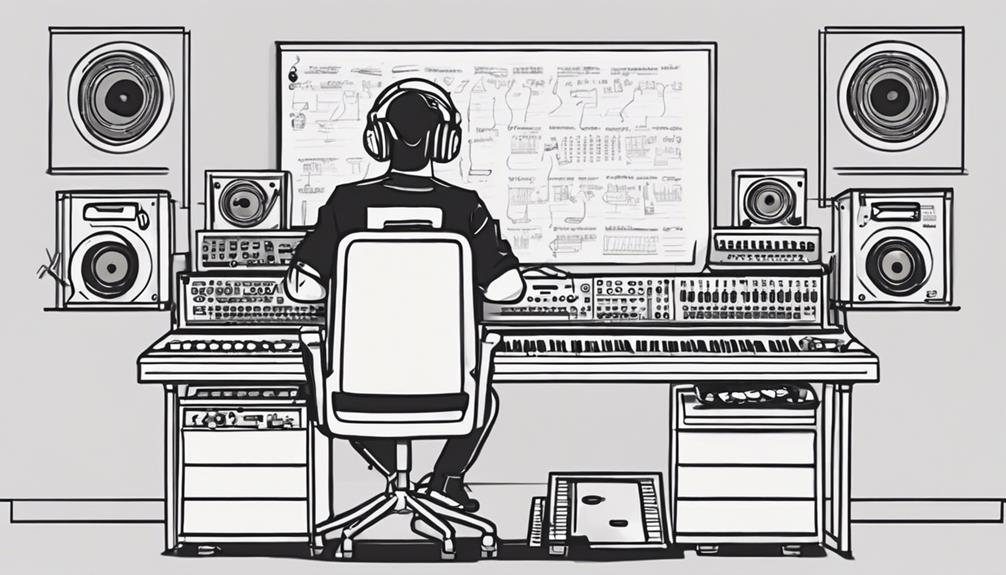
Explore your aspirations and ambitions in music production by establishing clear career goals that will guide your journey towards success. Setting specific objectives in music production, such as collaborating with major artists, producing for businesses, or releasing your own tracks to the public, can provide you with a roadmap to follow.
Having a vision for your career in music production will help you focus on developing the necessary skills and gaining valuable experience. By defining your career goals, you can direct your efforts towards training programs, networking opportunities, and job prospects within the industry.
It's essential to set achievable milestones aligned with your career goals to track your progress effectively and stay motivated on your path to success. Remember, your career goals in music production are the foundation upon which you can build a fulfilling and successful journey in the industry.
Investing in Training Programs
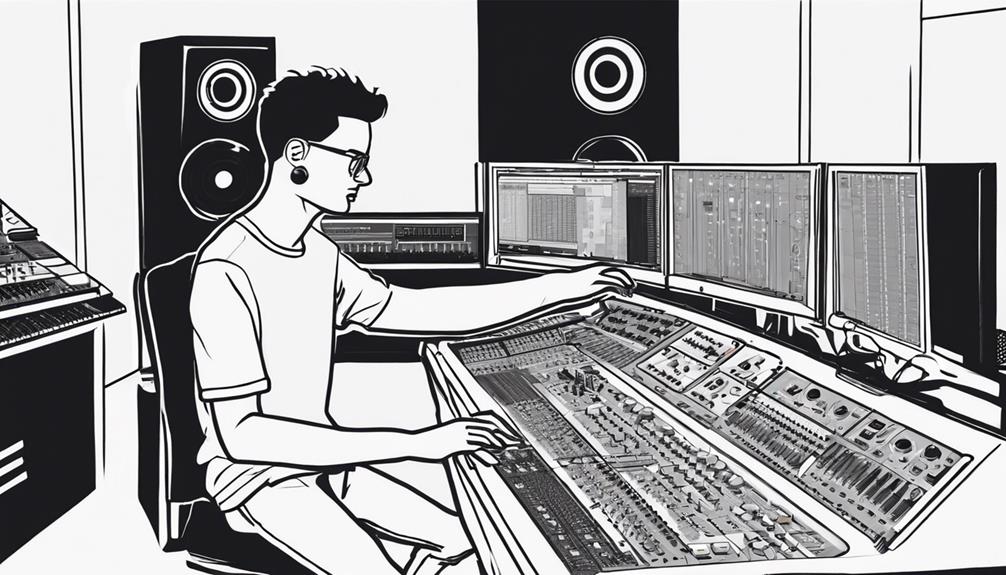
When considering investing in training programs for music production, it's vital to understand their importance in honing your skills and knowledge. Choosing the right program that aligns with your career goals and learning style is paramount for your development.
Whether you opt for online courses or in-person classes, make sure to weigh the pros and cons to make the best decision for your music production journey.
Training Program Importance
Investing in training programs for music production can greatly enhance your skills and knowledge in the field. Enrolling in a structured training program provides you with access to industry-standard tools, hands-on assistance, and mentorship from experienced instructors. These programs not only accelerate your growth by offering a clear learning path but also boost your confidence and prepare you for professional studio sessions. Additionally, industry-recognized training programs such as those offered by OIART can open up networking opportunities, essential for building connections within the music production industry.
- Structured learning paths for in-depth understanding.
- Access to industry-standard tools for practical experience.
- Hands-on assistance and guidance from experienced instructors.
- Accelerated growth and confidence building.
- Networking opportunities for career advancement.
Choosing the Right
To make an informed decision on training programs for music production, consider the specific skills and knowledge areas you aim to develop. Look for programs that offer thorough training in audio recording, modern recording techniques, and music theory.
Investing in specialized training programs like those provided by OIART can provide you with industry-recognized education that's highly valued in the music production field. These programs not only equip you with essential skills but also offer networking opportunities and entrepreneurship training, which are essential for career growth.
Graduates of reputable training programs like OIART often have access to hands-on experience, which is highly valued by employers in the music production industry. Remember, the industry places a high value on formal training, so choosing the right program can lead to a higher average salary and better career prospects as a music producer.
Online Vs. In-Person
Considering your learning preferences and goals, the choice between online and in-person training programs for music production can have a substantial impact on your educational experience and future career opportunities.
Online programs offer flexibility, interactive modules, and cost-effective options, allowing you to learn from anywhere with internet access. On the other hand, in-person training programs provide hands-on experience, networking opportunities, and an immersive learning environment that can enhance your skills and industry connections.
While online programs may be convenient, in-person programs at music schools or colleges grant access to professional studios, equipment, and immediate feedback from experienced instructors.
Ultimately, the decision between online and in-person training programs boils down to your preferred learning style and the level of hands-on experience you seek in mastering music production. Choose wisely to make the most of your educational journey.
Mastering Audio Engineering Skills
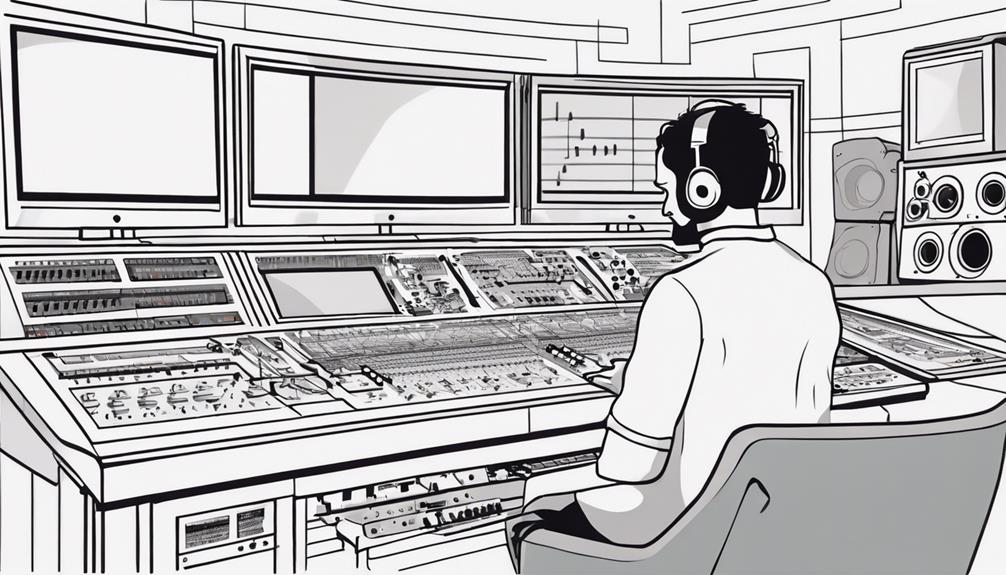
Developing proficiency in mastering audio engineering skills is essential for aspiring music producers. Understanding concepts such as signal flow, microphone placement, and acoustics is critical in the field of audio engineering. These skills play a major role in capturing high-quality sound during the recording process.
Additionally, mastering EQ, compression, and other effects is essential for polishing audio tracks and achieving a professional sound.
Proficiency in using audio editing software like Pro Tools, Logic Pro, or Ableton Live is fundamental for audio engineers to manipulate and enhance recorded sounds effectively. This software allows for precise editing, mixing, and mastering of audio tracks to achieve the desired final product.
Audio engineers often collaborate closely with music producers to make sure that the sound meets the creative vision for a track. By honing your skills in audio engineering, you can contribute significantly to the overall quality and success of music productions.
Achieving Success in Music Production
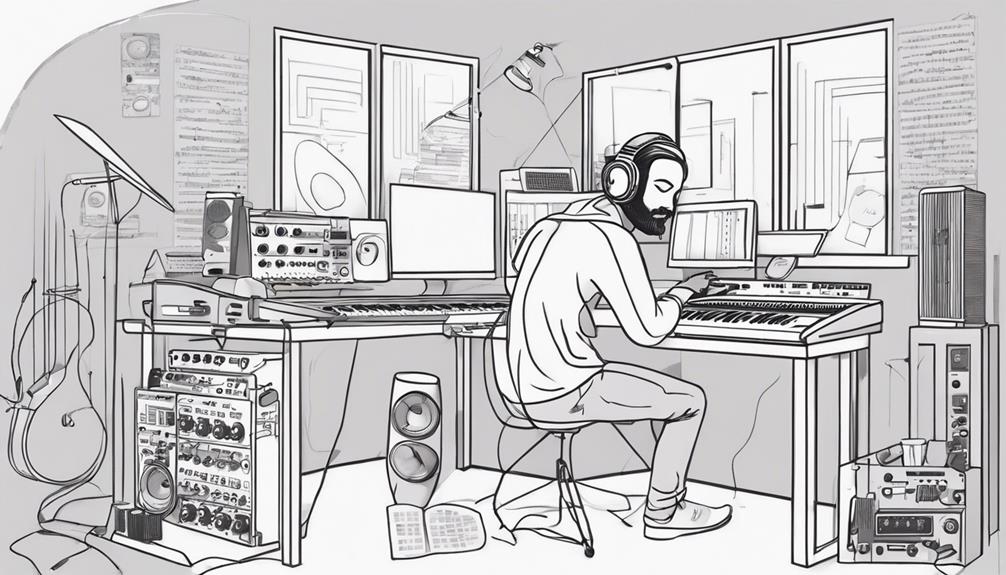
Developing a solid foundation in music theory and technical skills is essential for achieving success in music production. Collaborating with experienced producers and musicians can offer valuable insights and accelerate your learning process.
Consistent practice, along with experimentation and actively seeking feedback, are key strategies for continuous improvement in music production. Leveraging online resources, tutorials, and courses can help expand your knowledge and skills in this field.
Setting clear goals, staying organized, and networking within the industry are vital steps towards reaching your full potential in music production. By combining these elements and staying dedicated to honing your craft, you can increase your chances of success in the competitive world of music production.
Frequently Asked Questions
How Do I Teach Myself Music Production?
Teach yourself music production by utilizing online tutorials and courses. Practice regularly to hone skills like mixing and mastering. Take notes on unfamiliar concepts for deeper understanding. Identify strengths and weaknesses to focus on improvement. Experiment with different digital audio workstations (DAWs) to find the one that best suits your creative workflow. Incorporate study tips for music production, such as breaking complex techniques into smaller, manageable steps and setting clear goals for each practice session. Seek feedback from peers or online communities to gain valuable insights and further refine your craft.
What Is the Best Way to Learn Audio Production?
Want to excel in audio production? Immerse yourself in DAWs like Ableton Live. Explore online courses for insights. Connect with pros in forums. Attend workshops for in-depth skills. Seek mentorship to fast-track learning. Your journey starts now.
How Can I Learn to Be a Music Producer?
You can learn to be a music producer by mastering technical aspects like compression and EQ, studying music theory, exploring different genres, collaborating with others, seeking feedback, and practicing consistently. Utilize online resources and tutorials for faster progress.
How Long Does It Take to Learn the Basics of Music Production?
To learn the basics of music production, it typically takes a few months to a year. Dedication and practice are key. Online tutorials and practical experience speed up the process. With clear goals, you'll track progress effectively.
Conclusion
Now that you know the basics and have the right equipment, are you prepared to immerse yourself in the world of music production?
With dedication and practice, you can explore different techniques, set career goals, invest in training programs, and master audio engineering skills.
Success in music production is within reach – are you ready to take the next step and create your own unique sound?

